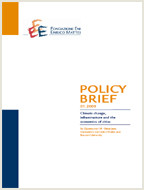Investing in a Low-Carbon Power Sector
In this policy brief we present and discuss recent research that analyzes the financial requirements to decarbonize the power sector.
We find that climate policy will not induce higher investments in the power sector with respect to those needed in the Reference scenario, i.e. the one occurring in the absence of climate policy, mainly because higher average investment costs in electricity generation are offset by a contraction of electricity demand. Thus, according to our work, a low-carbon world seems not to require higher investments. It rather requires a shift of resources towards a totally new technological mix.
This does not mean that the transition will not be costly from a macroeconomic point of view. Rather, it indicates that the costs will come from the necessary re-adjustment of our economies and not from higher financial needs in the power sector.
We show that criticalities will possibly emerge when investments have to be diverted –in a relatively short time frame– towards intrinsically complex and risky technologies (e.g. carbon capture and sequestration). These financial requirements, although costly, appear to be manageable from a financial point of view.
We suggest that governments can play a great role to smooth the transition to a low-carbon power sector by reducing the risk associated to the new technologies. In particular, we propose that revenues from auctioning carbon emissions permits are used to finance a sort of insurance fund for the power sector.

